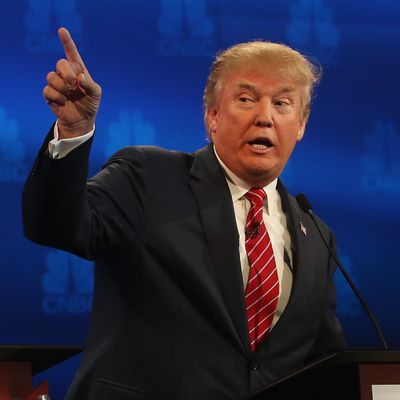
For most of 2015, I considered Donald Trump’s nomination a vanishingly unlikely event, on the grounds that Republican Party professionals and activists would band together to stop him out of self-preservation. The formal version of this theory is called The Party Decides, a book making the case that networks of political insiders steer the course of a nomination, and voters follow their cues. I always found The Party Decides somewhat overstated, but considered it true enough to seal Trump’s fate — Republican insiders may not always get the nominee they want, but surely they could keep out a nominee as uncontrollable and electorally disastrous as Trump. Marty Cohen, a co-author of The Party Decides, called Trump’s candidacy “the perfect test case.”
That assumption is proving increasingly shaky, causing me to rethink my assumptions about the power of insiders. But Seth Masket, a political scientist, is not reconsidering the theory. Masket argues that perhaps the “party just decided not to decide.” No reason to question the theory:
The events of the 2016 presidential election cycle have provided a great deal of fodder for attacking some leading political science texts on party nominations, especially The Party Decides. But the “theory didn’t predict this, ergo failure” conclusions aren’t exactly right. …
This is shaping up to be a very weird presidential nomination cycle. But the parties are not remotely in the same place, and before we throw out the best explanation we have about the way this system works, it is worth seriously reflecting on the evidence that the parties are currently providing us.
Okay, so we have a new addendum to the theory. The party decides, unless it chooses not to. The problem here is that Masket repeatedly held up this very theory as a reason why Trump could not win. Masket wrote last June:
[Trump] won’t win it. He’ll never get close to the Republican nomination, for the very simple reason that party insiders despise him. …
This would be a good time, by the way, to give thanks for parties and the gatekeeping function they serve. The main reason Trump won’t come within a mile of the White House is because you need the backing of a major party to do that. The Republicans won’t back him because they think he’d be bad for them—and they’re right.
And then again the next month:
We know he’s doing well, but we also know what this looks like by next spring, with Trump tens or hundreds of millions of dollars poorer than he is today, departing the presidential race with approximately zero delegates to his name. …
As I described here, the main problem Trump faces is that basically the entire Republican establishment despises him. And you actually need substantial party insider support to get the nomination….
the destruction of Trump’s candidacy is a foregone conclusion.
And again that month:
It was obvious from the beginning [Trump] wouldn’t get the nomination; the question was how the party would shut him down.
And then in September, when some critics offered that Trump’s continued survival atop the polls suggested that party insiders may not have the power attributed to them, Masket counseled patience:
[A]nother key point is that Party Decides offers a theory of which candidate will tend to win the nomination. No one has won anything yet in the 2016 race. There have been precisely zero primaries or caucuses. No delegates have been pledged. The only reason anyone is thinking Trump is in a good position for the nomination is because he’s leading in polls, which are highly unreliable predictors of voter behavior this far from an election. …
Trump, Fiorina, and Carson are just the sorts of outsider candidates who do well precisely when it does them the least good. If one of them actually wins the Republican nomination or is coming close to doing so by the end of winter, then yes, Party Decides is due for a revision. But we can certainly wait a few months to see if anything like that happens. No sense tossing out a perfectly good theory before it’s even been disproven.
Masket is now insisting that even Trump winning the nomination would not disprove the theory. But then, what value does this theory have?
Now, Masket is not a co-author of The Party Decides, and not all Party Decides enthusiasts were as adamant as Masket that Trump could not possibly win. If you say that your theory makes a given outcome certain, and that outcome fails to transpire, then what you have is a non-falsifiable theory.






























